-

Bussiness Mathematics
Authors: Jocelyn L. Reyes, Gemma S. Legaspi, Lourdes P. Gonzales
Business Mathematics, sometimes called consumer math or commercial math, is mathematics used by commercial enterprises to record and manage business operations. Business mathematics is an important tool in accounting, inventory management, marketing: sales forecasting and financial analysis.
The emphasis of Business Mathematics in the tertiary curriculum is on computational skills and practical application. It also includes a review of elementary arithmetic including fraction, decimals and percentages. The practical applications typically include checking accounts, price discounts, markups and markdowns, payroll calculations, and simple and compound interest Luckily, even if mathematics is not one of the student's strengths, there are several avenues available for learning business math. The syllabus-based work text in Business Mathematics is one of them.
Although many of the skills necessary for business success are related to interpersonal savvy and marketplace knowledge, most well-rounded business people need to know basic math skills, ideal for financial reports and other vital business documentation.
Business mathematics prepares the students in making general business decisions, like whether to expand into a new branch, whether to hire another employee, or if a commodity is marketable. Knowledge of business mathematics makes calculations less tedious and time-consuming, saving the business and its customers time and money.
-
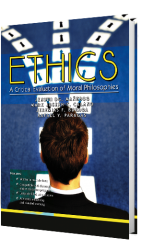
Ethics
Authors: Jensen DG. Mañebog, Mark Joseph T. Calano, Jeremias F. Buraga, Rafael Y. Paragas
HAVING A SENSE of morality is one of the things that differentiates us from animals. By nature, we are sincerely concerned with what is right and what is wrong in human behavior. Unlike animals, we care about living out ethical principles.
Since we can elicit abstract concepts such as truth, righteousness, and goodness, reflection about morality has been an essential element of human civilizations. Around the world, people ask basic moral questions such as, “What is the good?” “What makes a life a good life?” “What are the virtues of a human being?” and “What duties do we have to each other?”
A course in Ethics is thus undoubtedly fundamental and necessary. The subject significantly helps in endorsing valuable moral and social values like cooperation, social responsibility, respect for human rights, compliance with the law, and peace preservation. As Ethics calls for rational and righteous living, it encourages making good choices and living a purposeful and meaningful life.
ETHICS: A Critical Evaluation of Moral Philosophies was written to serve as a comprehensive introduction to the study of morality and ethical evaluation. It humbly aims to help the readers develop a conscious ethical sense and become critical in choosing a moral philosophy to live by.
Some Features of this Book:
This book possesses various features that make it an effective tool for both instructor and students:
- Written in module form. Each lecture comes with other important elements like objectives, discussions, activities, self-tests, and others which make each module a holistic learning package.
- Compatible with distance/online education program. Having ample experience in teaching under distance learning program, the authors also designed this book for online students. Modular in form, the book is self-taught so students can also advance at their own pace. Online students' responses to activities, self-tests and discussions may be sent to their respective professors through e-mail.
- Uniquely filled with analyses. Unlike many Ethics books, its modules do not only present and explain the various moral philosophies but also critically evaluate them by deeply examining them in detail.
- Advocates e-learning and blended learning. When adopted by professors, many instructions under Activities will allow students to further learn from additional online lectures which were already screened and filtered by the authors. Some activities are even programmed to let the students experience engaging in intellectual discussions with other people anywhere in the world online.
To the Professors:
If used creatively, this book could also integrate the development of thinking abilities with the four language skills so crucial to success in college and careers: reading, writing, speaking, and listening. Through thought-provoking readings, writing assignments (answering questions in the 'discussions,' reaction papers, and essays), and discussion exercises, students can improve their language skills.
Each module is purposely designed to comprise the following parts:
- A set of specific objectives which allows readers to anticipate the concepts, principles or skills they will learn in the module.
- The lecture proper which presents and discusses in details the topics.
- The analysis part where the critical evaluation and appraisal of the ethical theory could be read.
- Discussions which contain questions and guide topics professors can use during lectures, or for recitation and evaluation. These lead the students to further internalize the subject matter.
- Activities which provide students with means through which they can further internalize the topic or experience how the concepts can be applied. These can also serve as pre-lecture or post-lecture homework, or classroom task when the professor could not attend class.
- Self-tests which measure how well the students comprehend the lecture. Professors may use them for evaluation (quiz, pre-test, etc.).
- Professors under distance learning program may supplement this book, for instance, by providing a calendar of deadlines on which online students have to submit their responses (answers to self-test, reactions to discussions, products for activities, etc.).
- Ultimately, professors arc free to treat each module either as a self-contained unit or as a launch pad to other teaching-learning processes.
- To the Students:
- This book is designed to help you become knowledgeable and critical about various moral theories. Hopefully, this could also help you become better in reasoning skill, a quality which you can subsequently apply to your other academic subjects and various facets of life. The lectures, moreover, call for you to provide context for the topics by eventually considering them in forming or modifying your personal beliefs and principles.
- To online students, you should treat this book as your personal tutor. By dedicatedly reading the lectures and faithfully accomplishing all the things required by your assigned professor, you can teach yourself the necessary knowledge and skills related to Ethics. Remember that those competencies cannot be acquired by unintelligently subscribing to 'cut-and-paste' malpractice in accomplishing your tasks and assignments.
- To all students, if you wish to benefit much from this Ethics book, you should be ready to dedicate as much time as necessary. Taking this book seriously will help you transform into an intellectually mature, creative, and responsible moral person.
-
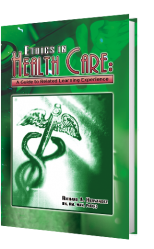
Ethics in Health Care
Author: Richard A. Hernandez
To act without rapacity, to use knowledge with wisdom, to respect interdependence, to operate without hubris and greed are not simply imperatives, they are an accurate scientific description of the means of survival
— Barbara Ward
You've got to be brave and you've got to be boa Brave enough to take your chance on your own discrimination — what's right and what's wrong, what's good and what's bad.
— Robert frost
Nursing is an important field in healthcare as it is the process for caring for, or nurturing client in all health care setting. It also refers to the care carried out by any individual who has had formal edification and preparation in the art and science of nursing. To further provide satisfactory service to their patients, nurses also have to observe moral and ethical principles and practices, as ethics and morals may serve to provide dilemmas and conflicts in rendering sufficient service to patients. In addition, ethical principles and morals must be properly given importance and significance in the nursing practice to ensure that the well-being and health of the patients would be given priority, thus, upholding and promoting the moral aspect of the practice. Ethical nursing practice involves the performance of nurses' roles and responsibilities which is facilitated with integration of social justice towards the promotion of life. Nurses should endeavor as much as possible individually and as a group to advocate for and eliminate social inequities, injustice and discrimination.
Today, nursing students are expected to think critically, and to utilize moral and ethical principles in carrying out their responsibilities during their related learning experiences. This book was made possible in anticipation of meeting learning needs, albeit the approach is synthesis of conceptual and theoretical highlights. Moreover, the purpose of this hook is to assist students integrate concepts of holistic nursing with the application of appropriate ethical and moral principles to all types of patients anytime in any health care setting.
Organization of the Text
Chapter 1: Ethics and Nursing Care focuses on the discussion of morality of an act and the significance of ethics in the health care industry.
Chapter 2: Approaches in Ethics highlights the factors to be considered in making decisions which are moral.
Chapter 3: The Roles of Nurse Ethicist enumerates the responsibilities of nurses to their patients, physicians and among others who are connected in the promotion of the client's welfare.
Chapter 4: Bioethical Principles discusses certain principles of ethics to be considered in making decision in times of conflicting issues, especially those that question the morality of an act.
Chapter 5: Issues on Family Planning discusses the different methods of natural and artificial family planning. It also enumerates propositions for and against institution of family planning.
Chapter 6: Issues on Abortion provides a discussion of different types of abortion and how the community at large reacts on the morality of this act.
Chapter 7: Issues on Euthanasia describes the different forms of euthanasia and enumerates some of the religious objections.
Chapter 8: Issues on In Vitro Fertilization describes the in vitro fertilization and discusses the morality of this act.
Chapter 9: Issues on Stem-cell Research describes stem cell and enumerates propositions for and against researches on stem cells.
Chapter 10: Issues on Medical Tourism focuses on the description, process and history of medical tourism and enumerates some of its legal and moral implications.
-
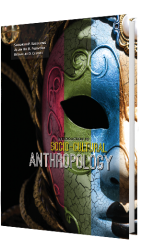
Flat Socio-Cultural
Authors: Saidamin P. Bagolong, Allan Hil B. Pajimola, Bryan Lee D. Celeste
The purpose of this textbook is to serve as a reference for an introductory course in Anthropology. This war, focus on concepts and theories of anthropology combined with both social and cultural understanding of humankind. Moreover; this will define basic terms of the course and how it can change your view of the world around you.
The textbook is likewise designed to facilitate the integral development of students for them to effect changes in the self as well as in the environment, thereby realizing the fullness of human life.
Even though this is an introductory textbook, we deliberately retain most of the salient features of anthropology as fairly new academic discipline.
This textbook could not have been written without help from many people whose ideas we have borrowed, modified and incorporated. We owe these people a special debt.
-

Food Safety and Sanitation
Authors: Mary Jean C. Ang, Hannah A. Balanon, Celia E. Cariño, Eunice D. Guerero, Marilou P. Pascual, Ma. Cecilia P. Pradez
Laboratory Manual for Principles of Food Safety and Sanitation with HACCP is a set of exercises to facilitate and enhance learning of the fundamental concepts of food safety, sanitation and hygiene and HACCP standards.
This laboratory manual is specifically designed for students in the food service and hospitality management courses, allowing them to apply and correlate many of the food safety concepts with various activities.
Organization of this manual is of two parts: Part I contains exercises for food safety and sanitation such as procedures for the identification of biological, chemical and physical hazards of food and Part II contains exercises applying the principles of Hazard Analysis and Critical Control Points (HACCP).
Each exercise comes with a Title – an overview of the content; Principles – bases of the underlying concepts and procedures; Objectives — competencies that every student should gain after each exercise; Materials — list of instruments, equipment supplies and reagents that will be used for each exercise; and Assessment — questions to evaluate learning.
The sequence of exercises is arranged in a way that will demonstrate the progression of the student from learning and mastering simple to complex procedures of food safety and sanitation with HACCP.
Considering these parameters, the purpose of this laboratory manual is to guide students through a process of development of experimentation, interpretation of data, and discovery in a manner that will complement the lecture and make the study of food safety and sanitation with HACCP both exciting and challenging.
-
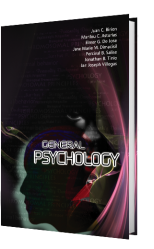
General Psychology 2013 (Birion)
Authors: Juan C. Birion, Marilou C. Asturias, Elmer G. De Jose, Jane Marie M. Dimacisil, Percival B. Salise, Jonathan B. Tinio, Jan Joseph Villegas
In writing this book, we believe that an introductory- course in psychology should provide clear understanding of what psychologists study, how they think and how they work. We also have a feeling that the teaching of an introductory psychology should cover wide and general topics fitting for a one-semester course covering as many topics that would be useful especially to those who would embark in advanced studies in this interesting academic field_ That is the reason why fifteen chapters are included in this book touching on topics of interest of the various schools of thoughts with varying perspectives. We do not intend to be eclectic, but we believe that psychology should not be structured and retarded due to boundaries in such a way that would hamper new knowledge and discoveries to emerge. Our understanding of human behavior should be continuing through intensive research and let novel theories and assumptions grow since human activities continue to change brought about by new gadgets and technology.. The student should'. able to gain much knowledge of facts and principles governing human behavior_ This is our gain
This book is truly a group effort. Two psychology professors from the Polytechnic University of the Philippines, Dr. Juan C. Birion who leads the group, together with Prof. Elmer G. De Jose, Assistant to the Vice President for Research; Vice President of Student Affairs of the Rizal Technological University, Dr. Marilou C. Asturian Prof. Jane Marie M. Dimacisil, professor of psychology and philosophy at the University of Perpetual Help-Biñan, Laguna (UPHL); Prof. Percival B. Salise, psychology professor of the University of Manila: Prof. Jonathan B. Tinio, Program Coordinator of the Psychology Unit of the College of Arts and Sciences at Holy Angel University-Angeles City. Pampanga; and Dr. Jan Joseph Villegas, International Lecturer of Psychology and Biological Sciences at the Asia Pacific Region. We were involved in the book's production in one way or another_
This book may not be the perfect book as we envisaged, but it is certainly an adequate representation of the most important areas in psychology. Hopefully, it will advance understanding of human behavior and will lead to newer, snore encompassing and more -useful principles governing human behavior. Its distinct features compared with other books in circulation are the inclusion of topics on history of psychology in the Philippines, and with some special topics on human development, intelligence and cognitive psychology, counseling psychology, social psychology and psychological assessment. Photographs of noted psychologists were illustrated so that students and readers will get familiar to them. Special types of exercises and techniques could help teachers vary in their approaches to teaching and make these approaches interesting and meaningful to students. A general psychology hook should develop in the students the attitude of studying human behavior in a scientific way that psychology is a science. It is to these students that this book is aimed, and it is hoped that the features of the text will help reach its targets.
-
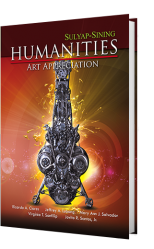
Humanities Art Appreciation
Authors: Ricardo A. Clores, Jeffrey A. Lubang, Mary Ann J. Salvador, Virginia T. Sanfilip, and Jovito R. Santos Jr.
Where do we put the humanities and the arts in a nation that budges and prods its students, like a mantra recited on a daily basis, to take skilled works? Today, the demands of the First World markets are nurses, caregivers and call center agents. Tomorrow, First World needs might shift to hotel and restaurant management practitioners, plumbers, electricians, automechanics and the like. As the country sinks deeper in its economic woes, at the same time tightens its grip even more to First World needs, students are left with no other choice but to submit. Not that there is anything wrong with being a caregiver or a call center agent, if this is what a student truly wants, but the condition paints even more of the pathetic and dwindling opportunities and possibilities for Filipino students.
-
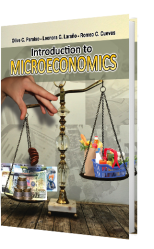
Intorduction to Microeconomics
Authors: Olive C. Paraiso, Leonora C. Laraño, and Romeo C. Cuevas
The purpose of this student learning material is to present an understanding of economics as an easy and enjoyable subject This learning material can be an aid to instructors and students because it presents the subject in a manner in which it can be easily understood. It could also prove useful, especially to students as a ready-made lecture notes that could save time spent in note-taking.
Each chapter is discussed and is followed by exercises to check the students' understanding. The series of check-up questions provide students to actively participate in classroom discussions and analyses.
Let this learning material be a guide in learning economics the easier way. This learning material be useful to all those performing in the important task of improving economic understanding and in the appreciation of subject.
Grateful recognition is afforded to our supportive colleague for the untiring motivation with regard to the pursuit of ideals and excellence in extracting ideas and thoughts from both the teaching force and the students.
-
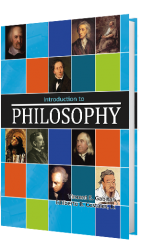
Introduction to Philosophy (Gabitan)
Authors: Vincent E. Gabitan, Edilberto B. Costales, Jr.
The aim of education is to develop morally and physical-1j) of the masses; to guide them into a prosperous, intelligent and noble people “
— Dr. Jose Rizal
As it is the wish and willful desire of every human being to attain education, it is the desire as well of the protagonists of this textbook to attain education that is valid and sound. An education that is acceptable not only in this part of the city but as well as nationally and globally.
Apparently, this textbook ventures into learning what is logical and sound education. This provides not only knowledge, for knowledge can easily be obsolete because of the rapid changes of the waves of time brought by the fast pace of scientific investigation and experimentation, and the constant evolution of technological gadgets, but also critical thinking skills that enable the students to understand recent information or knowledge, so that they will be able to cope with the trend of this era which is clarifying that if one is not aware of what is valid and invalid reasoning, his beliefs and principles will easily be manipulated.
This likewise optimistically facilitates the students in acquiring basic skills in reasoning, communication, and appreciation of the various disciplines in philosophy; and lastly, this subject facilitates students to think the way a Filipino thinks. Thus, they will be able to develop a sense of nationalism and patriotism.
All the above goals are indeed under the umbrella of philosophy. Thus, this subject provides an introduction to philosophy with ample emphasis on the basic concepts in Logic.
-
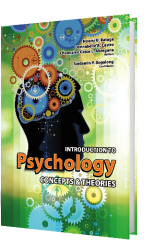
Introduction to Pscyhology(Bataga)
Authors: Noemi U. Bataga, Donnabelle, A. Castro, Charmaine Grace L. Abregana
Contributor: Saidamin P. Bagolong
The purpose of this textbook is to serve as an introductory course in Psychology. The book contains eleven chapters covering the basics of Psychology. In addition, this is designed to facilitate the integral development of students for them to understand concepts on human development, behavior, emotion and motivation as well as the salient features of intelligence and personality thereby realizing the fullness of individuals.
Even though this is an introductory textbook, we see to it that the students will learn to appreciate how Psychology can help them to see themselves as members of the community.
This is not just a compilation of concepts and theories but also constitutes a field that can make a difference in your life, in your communities and in our world.
This textbook could not have been written without help from many people whose ideas we have borrowed, modified and incorporated. To them we are especially indebted.
-

Introduction to Sociology (UM)
Authors: Saidamin P. Bagolong, Maribeth Q. Galindo, Jackson A. Sison, Deanna Febra C. Rodinas
The purpose of this textbook is to serve as reference for an introductory course in Sociology. The inclusion of family planning and other social issues provides background knowledge for an understanding of these, and other contemporary conditions.
The book is likewise designed to facilitate the integral development of students for them to effect changes in the self as well as the environment thereby realizing the fullness of human life.
Even though this is an introductory textbook, we have deliberately retained many of the salient features of sociology as a young discipline. This is the reason why we incorporated many social issues to stimulate students’ curiosity about learning society, culture, family planning, gender, environment and eve indigenous people.
This textbook could not have been written without help from many people whose ideas we have borrowed, modified and incorporated. To them we are deeply indebted.
-

Jose Rizal (Castañeda) 2013
Authors: Sherwin Prose C. Castañeda, Petra S. Ornos, Vivian O. San Felife, Luvismin S. Aves, Janry B. Colonia, Hazel D. Cao, Loida D. Zaide
This book is primarily intended for an undergraduate study of the life, works, and writings of our Great National Hero Di Jose Rizal. It must be remembered that, under the provisions of Republic Act. No, 1425, otherwise known as the Rizal Law, students in whatever coarse they pursue are required to undergo a study of the life, works, and writings of Dr. Jose Rizal.
The life and ideals of Rizal have served as inspiration not only to Filipinos but also to all freedom loving people throughout the world. We trust that this publication will broaden our understanding on the exemplary life and timeless ideals of Rizal.
In the completion of this book, the authors would like to thank Atty. Christopher Lycurgus Morania and Lorraine C. Castañeda of Bantog and Andaya Law Offices. Acknowledgement are likewise extended to the authors' respective families for their help and inspiration in making this book.
